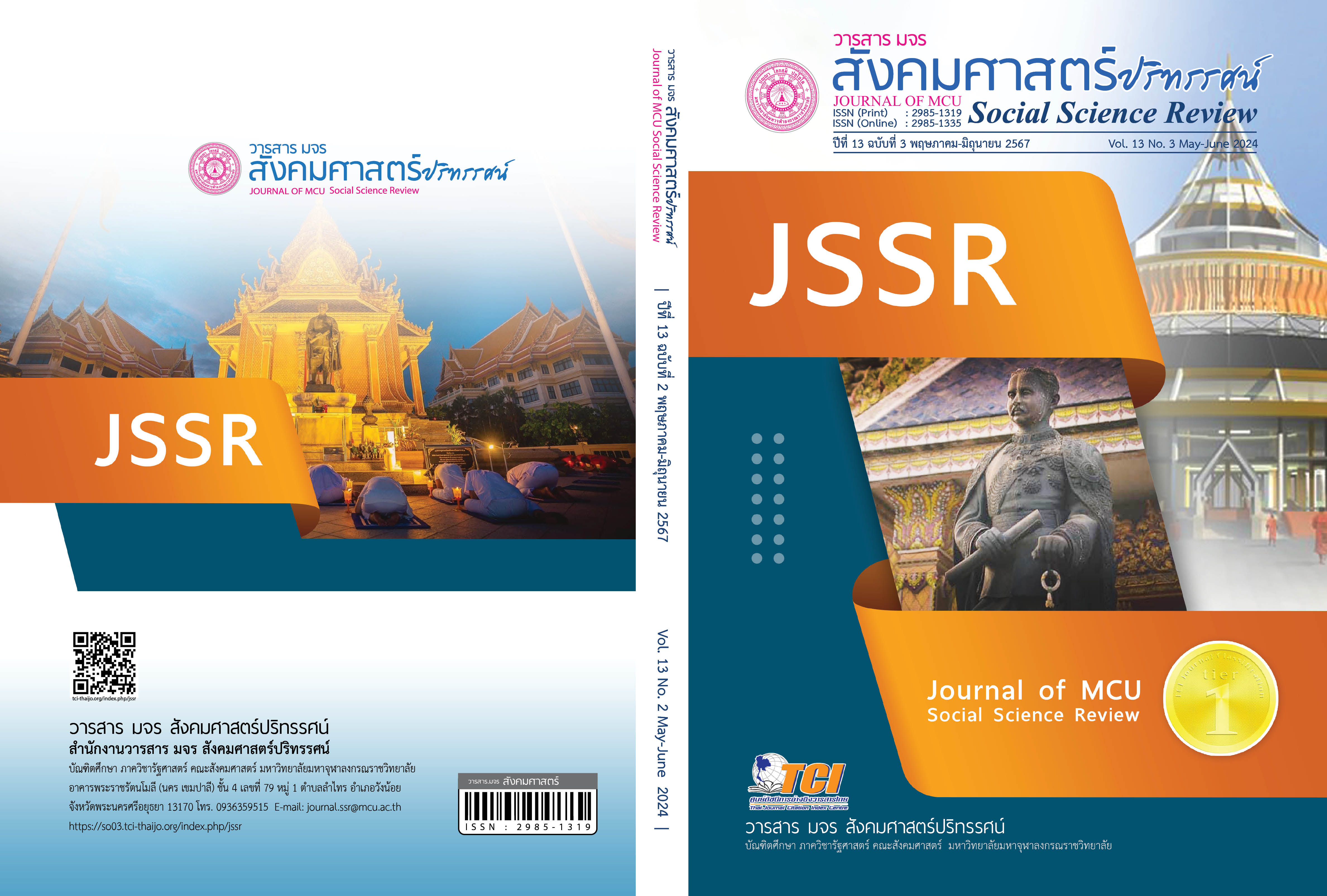[RETRACTED ARTICLE] สภาวะการถดถอยทางการเรียนรู้ของผู้เรียนระดับการศึกษาขั้นพื้นฐานในประเทศไทยช่วงสถานการณ์โควิด-19: สภาพการณ์ สาเหตุ และแนวทางการพัฒนาคุณภาพการเรียนรู้
คำสำคัญ:
การถดถอยทางการเรียนรู้, โควิด-19, ยุคปกติใหม่, ระบบการเรียนแบบเร่งรัดบทคัดย่อ
การรับรู้ตนเองของผู้เรียนระดับการศึกษาขั้นพื้นฐานในสถานการณ์โควิด-19 เป็นสาเหตุเกี่ยวกับการเปลี่ยนแปลงด้านการเรียนรู้ของตนเองในทิศทางที่มีแนวโน้มลดลง จากศึกษาลักษณะของภาวะถดถอยทางการเรียนรู้ที่มีการถดถอยของผู้เรียนในระดับการศึกษาขั้นพื้นฐานจากสถานการณ์การแพร่ระบาดของโควิด-19 พบว่า สถานศึกษามีการจัดการเรียนการสอนในหลากหลายรูปแบบ มีการใช้เครื่องมือและเทคโนโลยีในการเรียนการสอนอย่างหลากหลาย
มีการปรับเปลี่ยนนโยบาย การบริหารจัดการและการวัดและประเมินผลของสถานศึกษา ภาพรวมของผู้เรียนระดับการศึกษาขั้นพื้นฐานมีการรับรู้ภาวะถดถอยทางการเรียนรู้อยู่ในระดับปานกลาง การกำกับตนเองในการเรียนรู้ของผู้เรียนเป็นปัจจัยที่ส่งอิทธิพลทางตรงและโดยรวมต่อการรับรู้ภาวะถดถอยทางการเรียนรู้ของนักเรียนทุกระดับชั้นแนวทางการลดภาวะถดถอยทางการเรียนรู้สู่การพัฒนาคุณภาพการเรียนรู้ของผู้เรียนคือ การสร้างแรงจูงใจ การตั้งเป้าหมาย และการกำกับตนเองของผู้เรียนระหว่างการจัดการเรียนการสอน ผู้ปกครองและครูควรส่งเสริมให้ผู้เรียนตระหนักและรู้เท่าทันสื่อ รวมถึงการเฝ้าระวังและกำกับติดตามผู้เรียนอย่างใกล้ชิดในการเข้าถึงสื่อที่ไม่เกิดประโยชน์ต่อการเรียนรู้หรือสื่อที่ไม่เหมาะสมที่อาจส่งผลต่อการเรียนรู้ คุณลักษณะ และสุขภาพกายและใจของผู้เรียน โดยผู้ปกครองอาจมีส่วนร่วมในเรื่องของการวางแผนการเรียน กำกับติดตาม เตรียมความพร้อม ให้คำปรึกษา และส่งเสริมสนับสนุนการเรียนรู้ของผู้เรียน และมีการติดต่อสื่อสารกับครูผู้สอนเพื่อสอบถามและติดตามการเรียนของผู้เรียน
เอกสารอ้างอิง
ดารณี อุทัยรัตนกิจ. (2559). ครูแนะปรับวิธีสอน 3 ช่วงวัยอนุบาล-ประถม-มัธยม. สืบค้น 13 ธันวาคม 2564, จาก https://mgronline.com/qol/detail/9590000003478
ภูมิศรัณย์ ทองเลี่ยมนาค. (2564). สำรวจผลกระทบ COVID-19 จุดเปลี่ยนครั้งสำคัญของการศึกษาโลก. สืบค้น 14 ธันวาคม 2564, จาก https://shorturl.asia/UkL8d
_____. (2565). เอฟเฟกต์โควิดเขย่าการศึกษา เพิ่มแรงถดถอยการเรียนรู้. สืบค้น 13 มกราคม 2565, จาก https://www.eef.or.th/article-effects-of-covid-19/
วิชัย วงษ์ใหญ่ และมารุต พัฒผล. (2563). การออกแบบการเรียนรู้ใน New normal. กรุงเทพฯ: มหาวิทยาลัยศรีนครินทรวิโรฒ.
สำนักงานเลขาธิการสภาการศึกษา กระทรวงศึกษาธิการ. (2563). รายงานเรียนออนไลน์ยุคโควิด-19 : วิกฤตหรือโอกาสการศึกษาไทย. กรุงเทพฯ: สำนักมาตรฐานการศึกษาและพัฒนาการเรียนรู้สำนักงานเลขาธิการสภาการศึกษา กระทรวงศึกษาธิการ.
_____. (2564). รายงานการศึกษารูปแบบการจัดการเรียนรู้สำหรับนักเรียนระดับการศึกษาขั้นพื้นฐานที่ได้รับผลกระทบจากสถานการณ์โควิด-19. กรุงเทพฯ: สำนักมาตรฐานการศึกษาและพัฒนาการเรียนร็สำนักงานเลขาธิการสภาการศึกษากระทรวงศึกษาธิการ.
_____. (2565). การศึกษาภาวะถดถอยทางการเรียนรู้ของผู้เรียนระดับการศึกษาขั้นพื้นฐานในสถานการณ์โควิด-19 : สภาพการณ์ บทเรียน และแนวทางการพัฒนาคุณภาพการเรียนรู้. กรุงเทพฯ: สำนักมาตรฐานการศึกษาและพัฒนาการเรียนรู้สำนักงานเลขาธิการสภาการศึกษา กระทรวงศึกษาธิการ.
Asian Development Bank. (2021). Learning and earning losses from COVID-19 school closures in developing Asia. Retrieved March 22, 2020, from https://shorturl.asia/qC904
Azim Premji Foundation. (2021). Loss of learning during the pandemic. India: Azim Premji University.
Blaskó, Z. et al. (2021). Learning loss and educational inequalities in Europe: mapping the potential consequences of the COVID- 19 Crisis, Discussion paper series. Bonn, Germany: Deutsche Post Foundation.
Cardinal, J. (2020). Lost Learning: What does the research really say?. Geneva, Switzerland: International Baccalaureate Organization.
Cho, Y. et al. (2021). Philippine basic education system: strengthening effective learning during the COVID-19 pandemic and beyond. Retrieved March 20, 2022, from ttps://shorturl.asia/CblJ9
DiPietro, G. et al. (2020). The likely impact of COVID-19 on education: Reflections based on the existing literature and international datasets. Luxembourg: Publications Office of the European Union.
Fitzpatrick, R. et al. (2020). An international review of plans and actions for school reopening. Berkshire: Education Development Trust.
Great Schools Partnership. (2021). Learning Loss. Retrieved March 20, 2022, from https://shorturl.asia/mGgSs
Kaffenberger, M. (2021). Modelling the long-run learning impact of the COVID-19 learning shock: actions to (more than) mitigate loss. International Journal of Educational Development, 81(1), 1-21.
Kuhfeld, M. et al. (2020). Projecting the potential impact of COVID-19 school closures on academic achievement. Educational Researcher, 49(8), 549-565.
Locke, N. V. et al. (2021). Learning loss in reading and math in U.S. schools due to the COVID-19 pandemic. USA: Southern Methodist University.
Noam et al. (2021). Building back better to avert a learning catastrophe: Estimating learning loss from COVID-19 school shutdowns in Africa and facilitating short-term and long-term learning recovery. International Journal of Educational Development, 84(1), 1-14.
Raymond, M. E. (2021). Learning Losses-What to Do about Them. Hoover Institution: Stanford University.
Salciccioli, M. (2021). Understanding and addressing disruptions to learning during the COVID-19 pandemic. Retrieved March 20, 2022, from https://shorturl.asia/fTWn4
U.S. Department of Education, Office for Civil Rights. (2021). Education in a pandemic: the disparate impacts of COVID-19 on America’s students. Washington: U.S. Department of Education.
Zierer, K. (2021). Effects of pandemic-related school closures on pupils’ performance and learning in selected countries: a rapid review. Education Sciences, 11(6), 1-12.
ดาวน์โหลด
เผยแพร่แล้ว
รูปแบบการอ้างอิง
ฉบับ
ประเภทบทความ
สัญญาอนุญาต
ลิขสิทธิ์ (c) 2024 วารสาร มจร สังคมศาสตร์ปริทรรศน์

อนุญาตภายใต้เงื่อนไข Creative Commons Attribution-NonCommercial-NoDerivatives 4.0 International License.
เพื่อให้เป็นไปตามกฎหมายลิขสิทธิ์ ผู้นิพนธ์ทุกท่านต้องลงลายมือชื่อในแบบฟอร์มใบมอบลิขสิทธิ์บทความให้แก่วารสารฯ พร้อมกับบทความต้นฉบับที่ได้แก้ไขครั้งสุดท้าย นอกจากนี้ ผู้นิพนธ์ทุกท่านต้องยืนยันว่าบทความต้นฉบับที่ส่งมาตีพิมพ์นั้น ได้ส่งมาตีพิมพ์เฉพาะในวารสาร มจร สังคมศาสตร์ปริทรรศน์ เพียงแห่งเดียวเท่านั้น หากมีการใช้ภาพหรือตารางหรือเนื้อหาอื่นๆ ของผู้นิพนธ์อื่นที่ปรากฏในสิ่งตีพิมพ์อื่นมาแล้ว ผู้นิพนธ์ต้องขออนุญาตเจ้าของลิขสิทธิ์ก่อน พร้อมทั้งแสดงหนังสือที่ได้รับการยินยอมต่อบรรณาธิการ ก่อนที่บทความจะได้รับการตีพิมพ์ หากไม่เป็นไปตามข้อกำหนดเบื้องต้น ทางวารสารจะถอดบทความของท่านออกโดยไม่มีข้อยกเว้นใดๆ ทั้งสิ้น





